CIVIL LAW Lecture 8 Transactions shall mean


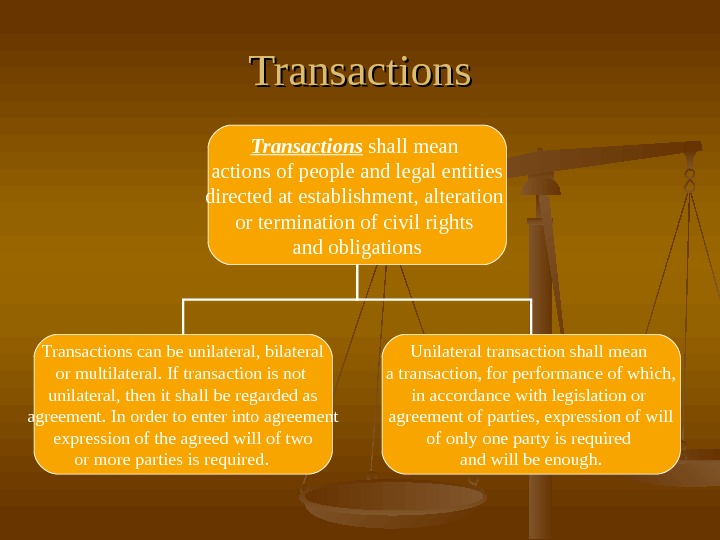
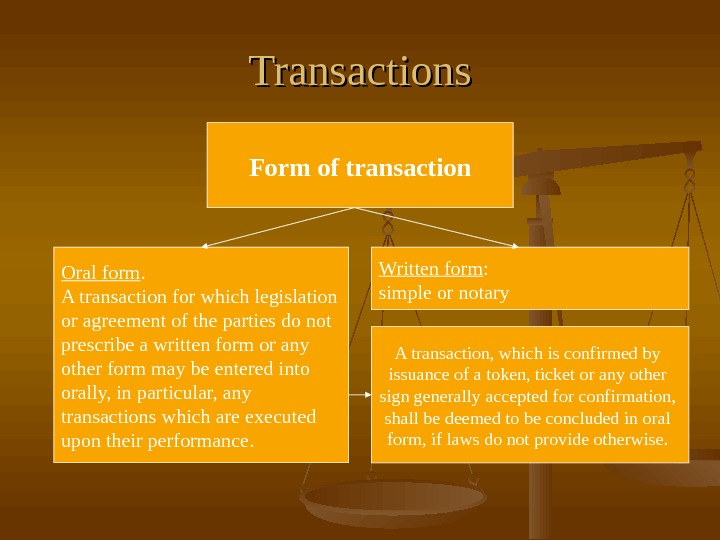


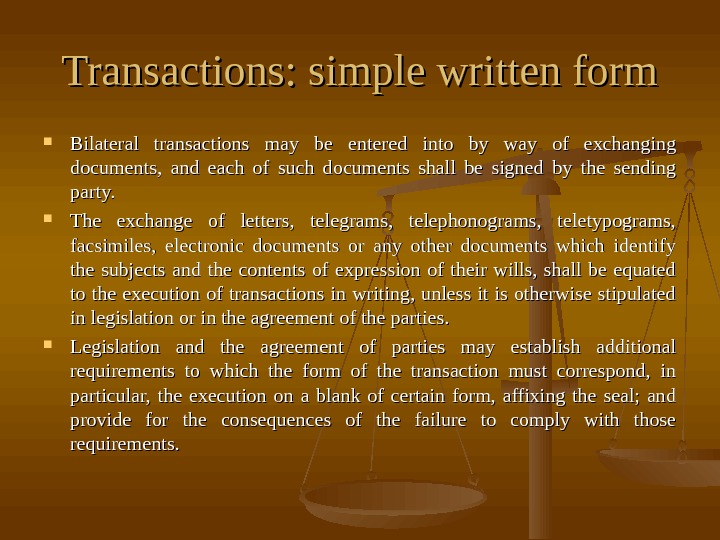



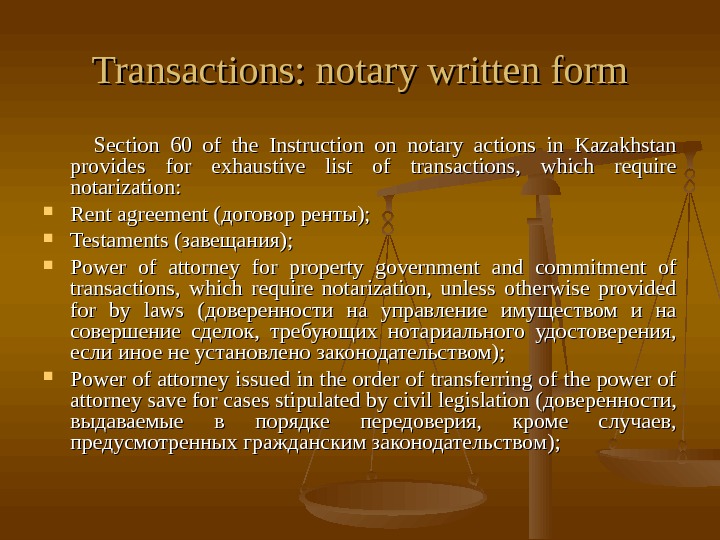
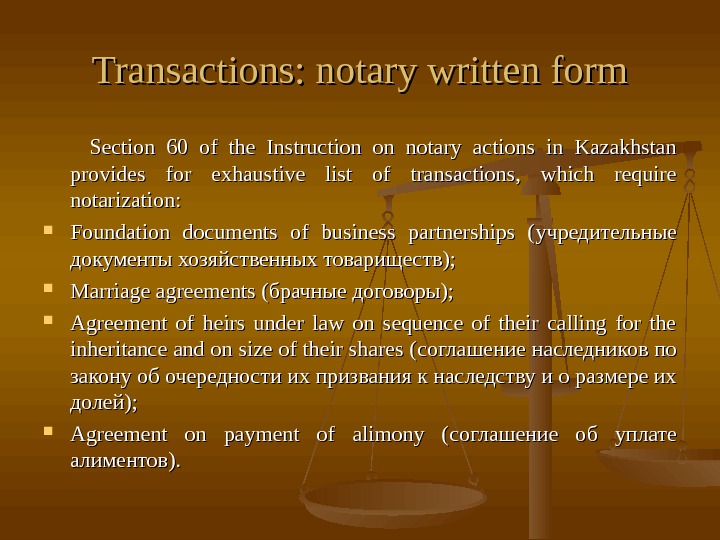
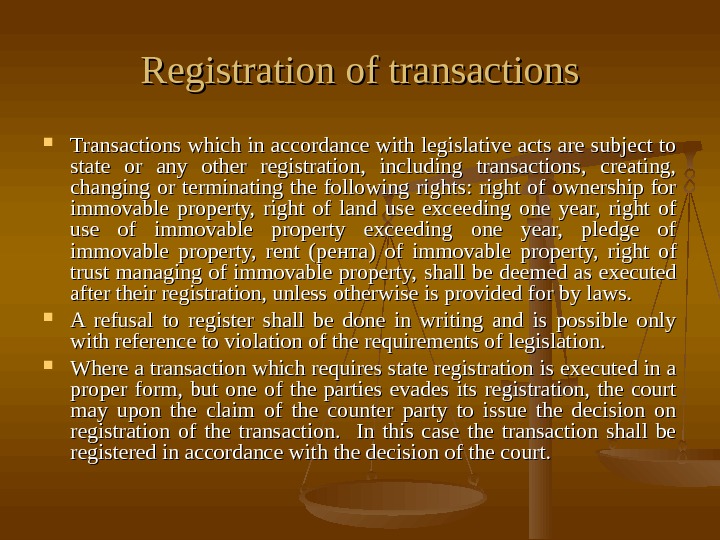
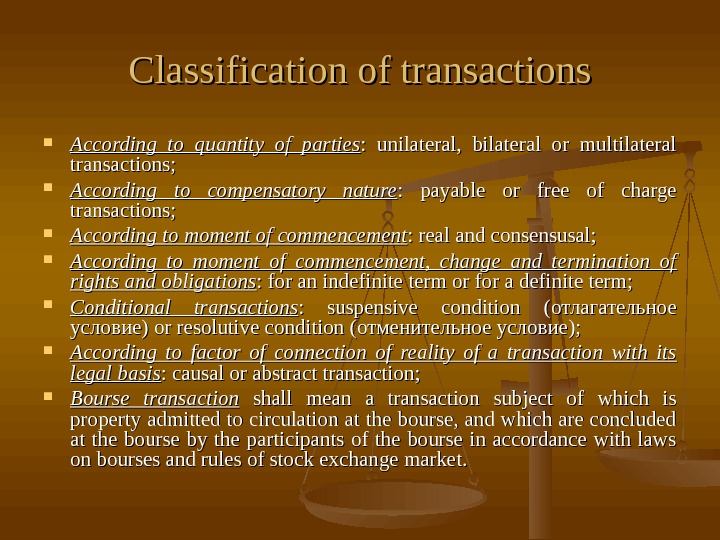

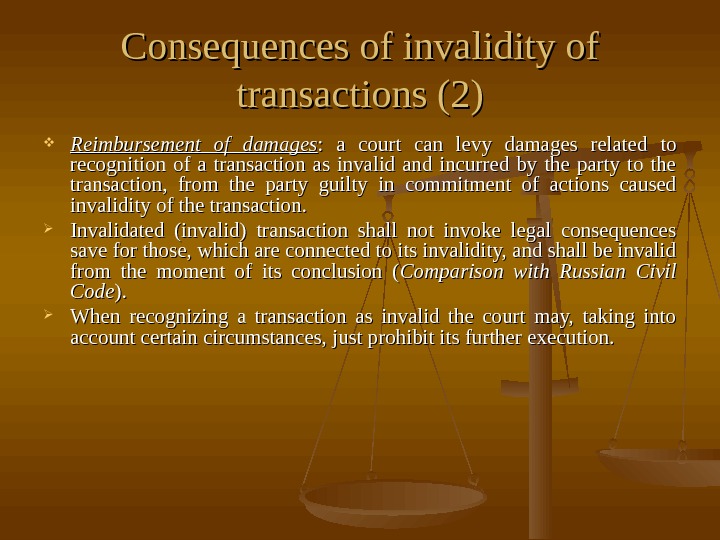
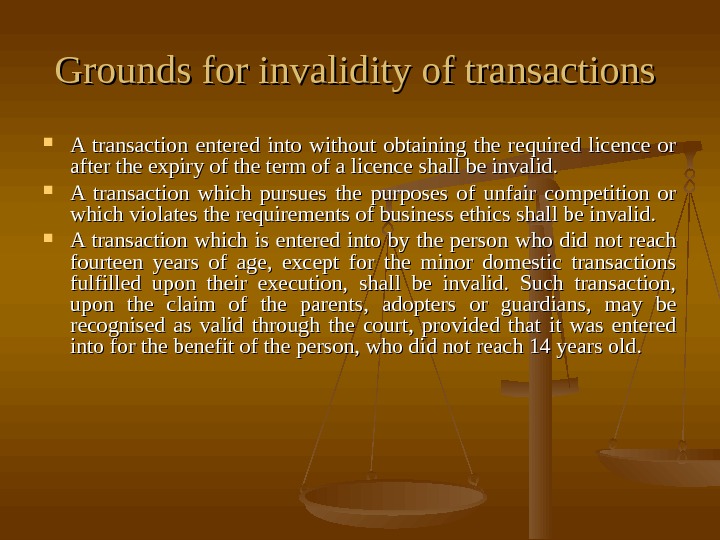
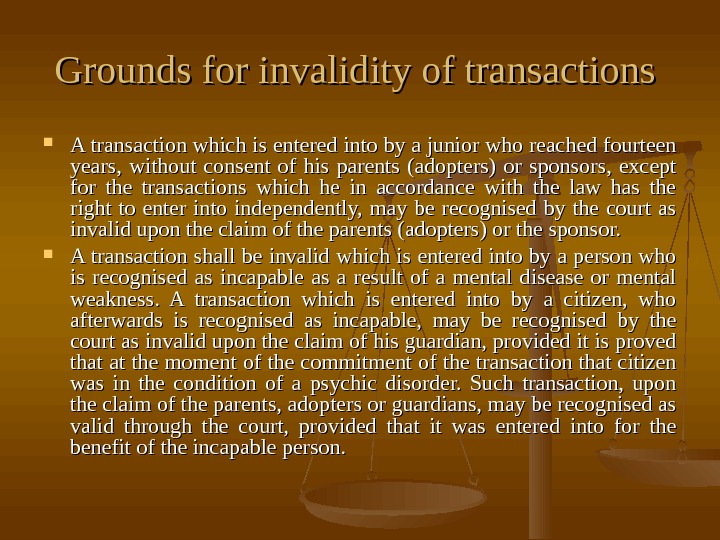
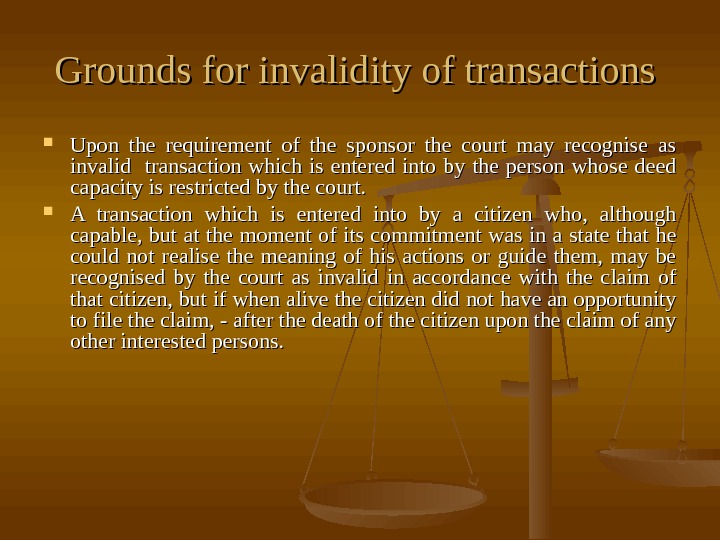
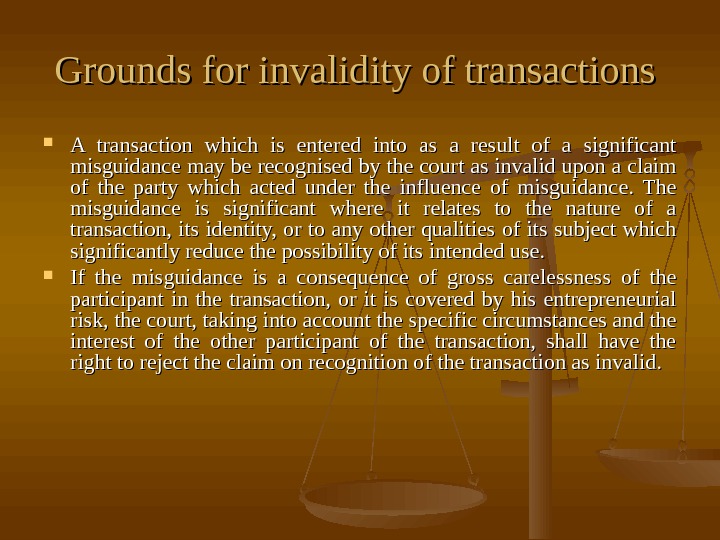

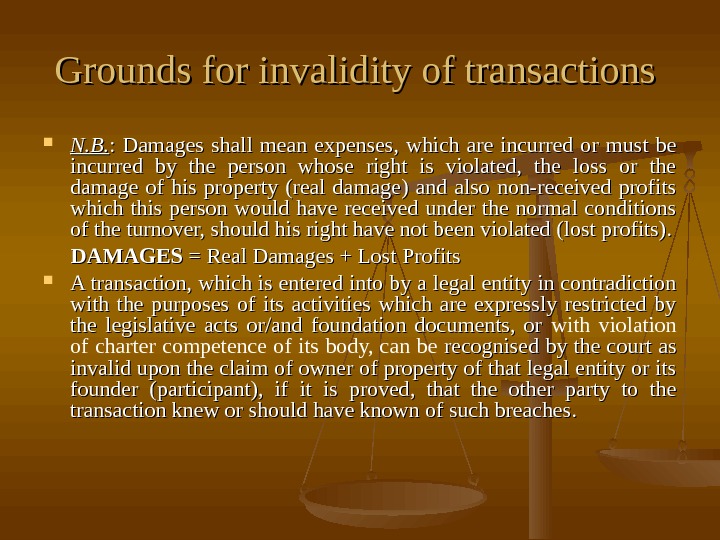
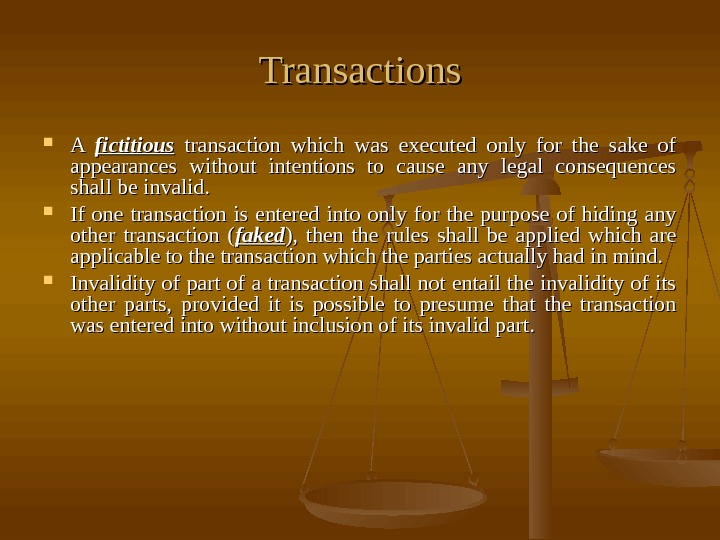
civil_law_transactions_lecture_8.ppt
- Размер: 148 Кб
- Количество слайдов: 22
Описание презентации CIVIL LAW Lecture 8 Transactions shall mean по слайдам
 CIVIL LAW Lecture
CIVIL LAW Lecture
 Transactions shall mean actions of people and legal entities directed at establishment, alteration or termination of civil rights and obligations Transactions can be unilateral, bilateral or multilateral. If transaction is not unilateral, then it shall be regarded as agreement. In order to enter into agreement expression of the agreed will of two or more parties is required. Unilateral transaction shall mean a transaction, for performance of which, in accordance with legislation or agreement of parties, expression of will of only one party is required and will be enough.
Transactions shall mean actions of people and legal entities directed at establishment, alteration or termination of civil rights and obligations Transactions can be unilateral, bilateral or multilateral. If transaction is not unilateral, then it shall be regarded as agreement. In order to enter into agreement expression of the agreed will of two or more parties is required. Unilateral transaction shall mean a transaction, for performance of which, in accordance with legislation or agreement of parties, expression of will of only one party is required and will be enough.
 Transactions Form of transaction Oral form. A transaction for which legislation or agreement of the parties do not prescribe a written form or any other form may be entered into orally, in particular, any transactions which are executed upon their performance. Written form : simple or notary A transaction, which is confirmed by issuance of a token, ticket or any other sign generally accepted for confirmation, shall be deemed to be concluded in oral form, if laws do not provide otherwise.
Transactions Form of transaction Oral form. A transaction for which legislation or agreement of the parties do not prescribe a written form or any other form may be entered into orally, in particular, any transactions which are executed upon their performance. Written form : simple or notary A transaction, which is confirmed by issuance of a token, ticket or any other sign generally accepted for confirmation, shall be deemed to be concluded in oral form, if laws do not provide otherwise.
 Transactions: simple written form The following transactions must be entered into in writing: those which are carried out in the course of entrepreneurial activities, except for transactions which are fulfilled upon their performance, unless it is otherwise stipulated in legislation for individual types of transactions, or it is ensued from the customs of the business practice; for the amount of more than 100 MCI, except for the transactions which are fulfilled upon their performance; in any other cases which are stipulated in legislation or the agreement of the parties.
Transactions: simple written form The following transactions must be entered into in writing: those which are carried out in the course of entrepreneurial activities, except for transactions which are fulfilled upon their performance, unless it is otherwise stipulated in legislation for individual types of transactions, or it is ensued from the customs of the business practice; for the amount of more than 100 MCI, except for the transactions which are fulfilled upon their performance; in any other cases which are stipulated in legislation or the agreement of the parties.
 Transactions: simple written form A transaction which is executed in writing, must be signed by the parties or their representatives, unless otherwise ensues from the customs of the business practice. It shall be allowed, when entering into transactions, to use facsimile copying of signatures, electronic digital signatures, unless this contradicts legislation or the requirements of one of the participants.
Transactions: simple written form A transaction which is executed in writing, must be signed by the parties or their representatives, unless otherwise ensues from the customs of the business practice. It shall be allowed, when entering into transactions, to use facsimile copying of signatures, electronic digital signatures, unless this contradicts legislation or the requirements of one of the participants.
 Transactions: simple written form Bilateral transactions may be entered into by way of exchanging documents, and each of such documents shall be signed by the sending party. The exchange of letters, telegrams, telephonograms, teletypograms, facsimiles, electronic documents or any other documents which identify the subjects and the contents of expression of their wills, shall be equated to the execution of transactions in writing, unless it is otherwise stipulated in legislation or in the agreement of the parties. Legislation and the agreement of parties may establish additional requirements to which the form of the transaction must correspond, in particular, the execution on a blank of certain form, affixing the seal; and provide for the consequences of the failure to comply with those requirements.
Transactions: simple written form Bilateral transactions may be entered into by way of exchanging documents, and each of such documents shall be signed by the sending party. The exchange of letters, telegrams, telephonograms, teletypograms, facsimiles, electronic documents or any other documents which identify the subjects and the contents of expression of their wills, shall be equated to the execution of transactions in writing, unless it is otherwise stipulated in legislation or in the agreement of the parties. Legislation and the agreement of parties may establish additional requirements to which the form of the transaction must correspond, in particular, the execution on a blank of certain form, affixing the seal; and provide for the consequences of the failure to comply with those requirements.
 Transactions: simple written form Where a citizen as a result of a physical shortage, disease or illiteracy is not able to personally sign, then upon his request a transaction may be signed by any other citizen. The signature of the latter, unless it is otherwise stipulated in legislation, must be witnessed by a notary or any other official who has the right to enter into such notary action with an indication of the reasons for which the person who entered into the transaction failed to sign it personally.
Transactions: simple written form Where a citizen as a result of a physical shortage, disease or illiteracy is not able to personally sign, then upon his request a transaction may be signed by any other citizen. The signature of the latter, unless it is otherwise stipulated in legislation, must be witnessed by a notary or any other official who has the right to enter into such notary action with an indication of the reasons for which the person who entered into the transaction failed to sign it personally.
 Transactions: simple written form Consequences of failure to comply with written form of a transaction: A failure to comply with the simple written form of a transaction shall not entail its invalidity, but it shall deprive the parties of the right to confirm its conclusion, contents or its execution by witness’s evidences in the case of a dispute. The parties, however, shall have the right to confirm the conclusion, contents or execution of a transaction by written or any other proofs except for the use of witness’s evidences. In the cases which are specifically stipulated in legislative acts or in the agreement of the parties, a failure to comply with the simple written form of a transaction shall entail its invalidity. A failure to comply with the simple written form of a foreign economic transaction, shall entail the invalidity of the transaction. N. B. : Foreign economic transaction shall mean a transaction, one of the parties to which is foreign individual or legal entity , , and the contents of a transaction is operations related to export or import of of goods, services, results of creative activity or rights to their use, mainly they are international sale-purchase agreements, supply agreements, transportation agreements, insurance agreements, etc. They shall be signed by both parties thereto.
Transactions: simple written form Consequences of failure to comply with written form of a transaction: A failure to comply with the simple written form of a transaction shall not entail its invalidity, but it shall deprive the parties of the right to confirm its conclusion, contents or its execution by witness’s evidences in the case of a dispute. The parties, however, shall have the right to confirm the conclusion, contents or execution of a transaction by written or any other proofs except for the use of witness’s evidences. In the cases which are specifically stipulated in legislative acts or in the agreement of the parties, a failure to comply with the simple written form of a transaction shall entail its invalidity. A failure to comply with the simple written form of a foreign economic transaction, shall entail the invalidity of the transaction. N. B. : Foreign economic transaction shall mean a transaction, one of the parties to which is foreign individual or legal entity , , and the contents of a transaction is operations related to export or import of of goods, services, results of creative activity or rights to their use, mainly they are international sale-purchase agreements, supply agreements, transportation agreements, insurance agreements, etc. They shall be signed by both parties thereto.
 Transactions: notary written form In the cases which are stipulated in legislative acts or by the agreement of the parties, written transactions shall be deemed to be entered into only upon their notarisation. The failure to comply with these requirements shall entail the invalidity of the transaction with the following consequences: when a transaction is recognised as invalid, each party shall be obliged to return to the other party everything that was received under the transaction, and where it is not possible to return it in kind, to return its value through money. Where a transaction which requires notarisation is actually fulfilled by the parties or by one of the parties, and by its contents does not contradict legislation and does not violate the rights of third parties, the court upon the application of the interested party may recognise the transaction as valid. In that case the subsequent notarisation of the transaction is not required.
Transactions: notary written form In the cases which are stipulated in legislative acts or by the agreement of the parties, written transactions shall be deemed to be entered into only upon their notarisation. The failure to comply with these requirements shall entail the invalidity of the transaction with the following consequences: when a transaction is recognised as invalid, each party shall be obliged to return to the other party everything that was received under the transaction, and where it is not possible to return it in kind, to return its value through money. Where a transaction which requires notarisation is actually fulfilled by the parties or by one of the parties, and by its contents does not contradict legislation and does not violate the rights of third parties, the court upon the application of the interested party may recognise the transaction as valid. In that case the subsequent notarisation of the transaction is not required.
 Transactions: notary written form Section 60 of the Instruction on notary actions in Kazakhstan provides for exhaustive list of transactions, which require notarization: Rent agreement ( договор ренты )) ; ; Testaments ( завещания )) ; ; Power of attorney for property government and commitment of transactions, which require notarization, unless otherwise provided for by laws ( доверенности на управление имуществом и на совершение сделок, требующих нотариального удостоверения, если иное не установлено законодательством )) ; ; Power of attorney issued in the order of transferring of the power of attorney save for cases stipulated by civil legislation ( доверенности, выдаваемые в порядке передоверия, кроме случаев, предусмотренных гражданским законодательством )) ; ;
Transactions: notary written form Section 60 of the Instruction on notary actions in Kazakhstan provides for exhaustive list of transactions, which require notarization: Rent agreement ( договор ренты )) ; ; Testaments ( завещания )) ; ; Power of attorney for property government and commitment of transactions, which require notarization, unless otherwise provided for by laws ( доверенности на управление имуществом и на совершение сделок, требующих нотариального удостоверения, если иное не установлено законодательством )) ; ; Power of attorney issued in the order of transferring of the power of attorney save for cases stipulated by civil legislation ( доверенности, выдаваемые в порядке передоверия, кроме случаев, предусмотренных гражданским законодательством )) ; ;
 Transactions: notary written form Section 60 of the Instruction on notary actions in Kazakhstan provides for exhaustive list of transactions, which require notarization: Foundation documents of business partnerships ( учредительные документы хозяйственных товариществ )) ; ; Marriage agreements ( брачные договоры )) ; ; Agreement of heirs under law on sequence of their calling for the inheritance and on size of their shares ( соглашение наследников по закону об очередности их призвания к наследству и о размере их долей )) ; ; Agreement on payment of alimony ( соглашение об уплате алиментов )). .
Transactions: notary written form Section 60 of the Instruction on notary actions in Kazakhstan provides for exhaustive list of transactions, which require notarization: Foundation documents of business partnerships ( учредительные документы хозяйственных товариществ )) ; ; Marriage agreements ( брачные договоры )) ; ; Agreement of heirs under law on sequence of their calling for the inheritance and on size of their shares ( соглашение наследников по закону об очередности их призвания к наследству и о размере их долей )) ; ; Agreement on payment of alimony ( соглашение об уплате алиментов )). .
 Registration of transactions Transactions which in accordance with legislative acts are subject to state or any other registration, including transactions, creating, changing or terminating the following rights: right of ownership for immovable property, right of land use exceeding one year, right of use of immovable property exceeding one year, pledge of immovable property, rent ( рента) of immovable property, right of trust managing of immovable property, shall be deemed as executed after their registration, unless otherwise is provided for by laws. A refusal to register shall be done in writing and is possible only with reference to violation of the requirements of legislation. Where a transaction which requires state registration is executed in a proper form, but one of the parties evades its registration, the court may upon the claim of the counter party to issue the decision on registration of the transaction. In this case the transaction shall be registered in accordance with the decision of the court.
Registration of transactions Transactions which in accordance with legislative acts are subject to state or any other registration, including transactions, creating, changing or terminating the following rights: right of ownership for immovable property, right of land use exceeding one year, right of use of immovable property exceeding one year, pledge of immovable property, rent ( рента) of immovable property, right of trust managing of immovable property, shall be deemed as executed after their registration, unless otherwise is provided for by laws. A refusal to register shall be done in writing and is possible only with reference to violation of the requirements of legislation. Where a transaction which requires state registration is executed in a proper form, but one of the parties evades its registration, the court may upon the claim of the counter party to issue the decision on registration of the transaction. In this case the transaction shall be registered in accordance with the decision of the court.
 Classification of transactions According to quantity of parties : unilateral, bilateral or multilateral transactions; According to compensatory nature : payable or free of charge transactions; According to moment of commencement : real and consensusal; According to moment of commencement, change and termination of rights and obligations : for an indefinite term or for a definite term; Conditional transactions : suspensive condition ( отлагательное условие) or resolutive condition (отменительное условие); According to factor of connection of reality of a transaction with its legal basis : causal or abstract transaction; Bourse transaction shall mean a transaction subject of which is property admitted to circulation at the bourse, and which are concluded at the bourse by the participants of the bourse in accordance with laws on bourses and rules of stock exchange market.
Classification of transactions According to quantity of parties : unilateral, bilateral or multilateral transactions; According to compensatory nature : payable or free of charge transactions; According to moment of commencement : real and consensusal; According to moment of commencement, change and termination of rights and obligations : for an indefinite term or for a definite term; Conditional transactions : suspensive condition ( отлагательное условие) or resolutive condition (отменительное условие); According to factor of connection of reality of a transaction with its legal basis : causal or abstract transaction; Bourse transaction shall mean a transaction subject of which is property admitted to circulation at the bourse, and which are concluded at the bourse by the participants of the bourse in accordance with laws on bourses and rules of stock exchange market.
 Consequences of invalidity of transactions (1) When requirements provided to the form, contents or participants of a transaction, as well as to the freedom of expression of their will, are breached, the transaction can be invalidated by the court under the claim of interested parties, proper state body or prosecutor. Bilateral restitution : return by the parties to each other of everything received under the transaction, i. e. reinstatement of the parties` initial positions. Unilateral restitution : property shall be returned only to one of the parties (bona fide), the other party which was acting with a criminal objective shall not receive anything, and all received by the latter under the transaction shall be confiscated. Non-admission of restitution (confiscation) : If both parties to a transaction have a criminal objective, then all received under the transaction or due to be received under it, shall be, pursuant to the decision or sentence of the court, confiscated.
Consequences of invalidity of transactions (1) When requirements provided to the form, contents or participants of a transaction, as well as to the freedom of expression of their will, are breached, the transaction can be invalidated by the court under the claim of interested parties, proper state body or prosecutor. Bilateral restitution : return by the parties to each other of everything received under the transaction, i. e. reinstatement of the parties` initial positions. Unilateral restitution : property shall be returned only to one of the parties (bona fide), the other party which was acting with a criminal objective shall not receive anything, and all received by the latter under the transaction shall be confiscated. Non-admission of restitution (confiscation) : If both parties to a transaction have a criminal objective, then all received under the transaction or due to be received under it, shall be, pursuant to the decision or sentence of the court, confiscated.
 Consequences of invalidity of transactions (2) Reimbursement of damages : a court can levy damages related to recognition of a transaction as invalid and incurred by the party to the transaction, from the party guilty in commitment of actions caused invalidity of the transaction. Invalidated (invalid) transaction shall not invoke legal consequences save for those, which are connected to its invalidity, and shall be invalid from the moment of its conclusion ( Comparison with Russian Civil Code ). When recognizing a transaction as invalid the court may, taking into account certain circumstances, just prohibit its further execution.
Consequences of invalidity of transactions (2) Reimbursement of damages : a court can levy damages related to recognition of a transaction as invalid and incurred by the party to the transaction, from the party guilty in commitment of actions caused invalidity of the transaction. Invalidated (invalid) transaction shall not invoke legal consequences save for those, which are connected to its invalidity, and shall be invalid from the moment of its conclusion ( Comparison with Russian Civil Code ). When recognizing a transaction as invalid the court may, taking into account certain circumstances, just prohibit its further execution.
 Grounds for invalidity of transactions A transaction entered into without obtaining the required licence or after the expiry of the term of a licence shall be invalid. A transaction which pursues the purposes of unfair competition or which violates the requirements of business ethics shall be invalid. A transaction which is entered into by the person who did not reach fourteen years of age, except for the minor domestic transactions fulfilled upon their execution, shall be invalid. Such transaction, upon the claim of the parents, adopters or guardians, may be recognised as valid through the court, provided that it was entered into for the benefit of the person, who did not reach 14 years old.
Grounds for invalidity of transactions A transaction entered into without obtaining the required licence or after the expiry of the term of a licence shall be invalid. A transaction which pursues the purposes of unfair competition or which violates the requirements of business ethics shall be invalid. A transaction which is entered into by the person who did not reach fourteen years of age, except for the minor domestic transactions fulfilled upon their execution, shall be invalid. Such transaction, upon the claim of the parents, adopters or guardians, may be recognised as valid through the court, provided that it was entered into for the benefit of the person, who did not reach 14 years old.
 Grounds for invalidity of transactions A transaction which is entered into by a junior who reached fourteen years, without consent of his parents (adopters) or sponsors, except for the transactions which he in accordance with the law has the right to enter into independently, may be recognised by the court as invalid upon the claim of the parents (adopters) or the sponsor. A transaction shall be invalid which is entered into by a person who is recognised as incapable as a result of a mental disease or mental weakness. A transaction which is entered into by a citizen, who afterwards is recognised as incapable, may be recognised by the court as invalid upon the claim of his guardian, provided it is proved that at the moment of the commitment of the transaction that citizen was in the condition of a psychic disorder. Such transaction, upon the claim of the parents, adopters or guardians, may be recognised as valid through the court, provided that it was entered into for the benefit of the incapable person.
Grounds for invalidity of transactions A transaction which is entered into by a junior who reached fourteen years, without consent of his parents (adopters) or sponsors, except for the transactions which he in accordance with the law has the right to enter into independently, may be recognised by the court as invalid upon the claim of the parents (adopters) or the sponsor. A transaction shall be invalid which is entered into by a person who is recognised as incapable as a result of a mental disease or mental weakness. A transaction which is entered into by a citizen, who afterwards is recognised as incapable, may be recognised by the court as invalid upon the claim of his guardian, provided it is proved that at the moment of the commitment of the transaction that citizen was in the condition of a psychic disorder. Such transaction, upon the claim of the parents, adopters or guardians, may be recognised as valid through the court, provided that it was entered into for the benefit of the incapable person.
 Grounds for invalidity of transactions Upon the requirement of the sponsor the court may recognise as invalid transaction which is entered into by the person whose deed capacity is restricted by the court. A transaction which is entered into by a citizen who, although capable, but at the moment of its commitment was in a state that he could not realise the meaning of his actions or guide them, may be recognised by the court as invalid in accordance with the claim of that citizen, but if when alive the citizen did not have an opportunity to file the claim, — after the death of the citizen upon the claim of any other interested persons.
Grounds for invalidity of transactions Upon the requirement of the sponsor the court may recognise as invalid transaction which is entered into by the person whose deed capacity is restricted by the court. A transaction which is entered into by a citizen who, although capable, but at the moment of its commitment was in a state that he could not realise the meaning of his actions or guide them, may be recognised by the court as invalid in accordance with the claim of that citizen, but if when alive the citizen did not have an opportunity to file the claim, — after the death of the citizen upon the claim of any other interested persons.
 Grounds for invalidity of transactions A transaction which is entered into as a result of a significant misguidance may be recognised by the court as invalid upon a claim of the party which acted under the influence of misguidance. The misguidance is significant where it relates to the nature of a transaction, its identity, or to any other qualities of its subject which significantly reduce the possibility of its intended use. If the misguidance is a consequence of gross carelessness of the participant in the transaction, or it is covered by his entrepreneurial risk, the court, taking into account the specific circumstances and the interest of the other participant of the transaction, shall have the right to reject the claim on recognition of the transaction as invalid.
Grounds for invalidity of transactions A transaction which is entered into as a result of a significant misguidance may be recognised by the court as invalid upon a claim of the party which acted under the influence of misguidance. The misguidance is significant where it relates to the nature of a transaction, its identity, or to any other qualities of its subject which significantly reduce the possibility of its intended use. If the misguidance is a consequence of gross carelessness of the participant in the transaction, or it is covered by his entrepreneurial risk, the court, taking into account the specific circumstances and the interest of the other participant of the transaction, shall have the right to reject the claim on recognition of the transaction as invalid.
 Grounds for invalidity of transactions A transaction which is entered into under the influence of fraud, violence, or threat, and also a transaction that the person was compelled to enter into as a result of a combination of difficult circumstances and on conditions extremely unprofitable for himself which was exploited by the other party (shackling agreement), may be recognised by the court as invalid upon the claim of the victim. A transaction which is concluded as a result of a malicious collusion of the representative of one party with the other party, may be recognised by the court as invalid upon the action of the victimized party. Compensation of damages which are inflicted upon the victimised party, may be imposed upon the unfair representative in the procedure of subsidiary liability.
Grounds for invalidity of transactions A transaction which is entered into under the influence of fraud, violence, or threat, and also a transaction that the person was compelled to enter into as a result of a combination of difficult circumstances and on conditions extremely unprofitable for himself which was exploited by the other party (shackling agreement), may be recognised by the court as invalid upon the claim of the victim. A transaction which is concluded as a result of a malicious collusion of the representative of one party with the other party, may be recognised by the court as invalid upon the action of the victimized party. Compensation of damages which are inflicted upon the victimised party, may be imposed upon the unfair representative in the procedure of subsidiary liability.
 Grounds for invalidity of transactions N. B. : Damages shall mean expenses, which are incurred or must be incurred by the person whose right is violated, the loss or the damage of his property (real damage) and also non-received profits which this person would have received under the normal conditions of the turnover, should his right have not been violated (lost profits). . DAMAGES = Real Damages + Lost Profits A transaction, which is entered into by a legal entity in contradiction with the purposes of its activities which are expressly restricted by the legislative acts or/and foundation documents, or with violation of charter competence of its body, can be recognised by the court as invalid upon the claim of owner of property of that legal entity or its founder (participant), if it is proved, that the other party to the transaction knew or should have known of such breaches.
Grounds for invalidity of transactions N. B. : Damages shall mean expenses, which are incurred or must be incurred by the person whose right is violated, the loss or the damage of his property (real damage) and also non-received profits which this person would have received under the normal conditions of the turnover, should his right have not been violated (lost profits). . DAMAGES = Real Damages + Lost Profits A transaction, which is entered into by a legal entity in contradiction with the purposes of its activities which are expressly restricted by the legislative acts or/and foundation documents, or with violation of charter competence of its body, can be recognised by the court as invalid upon the claim of owner of property of that legal entity or its founder (participant), if it is proved, that the other party to the transaction knew or should have known of such breaches.
 Transactions A A fictitious transaction which was executed only for the sake of appearances without intentions to cause any legal consequences shall be invalid. If one transaction is entered into only for the purpose of hiding any other transaction ( faked ), then the rules shall be applied which are applicable to the transaction which the parties actually had in mind. Invalidity of part of a transaction shall not entail the invalidity of its other parts, provided it is possible to presume that the transaction was entered into without inclusion of its invalid part.
Transactions A A fictitious transaction which was executed only for the sake of appearances without intentions to cause any legal consequences shall be invalid. If one transaction is entered into only for the purpose of hiding any other transaction ( faked ), then the rules shall be applied which are applicable to the transaction which the parties actually had in mind. Invalidity of part of a transaction shall not entail the invalidity of its other parts, provided it is possible to presume that the transaction was entered into without inclusion of its invalid part.

